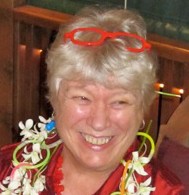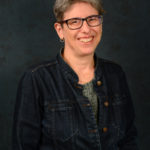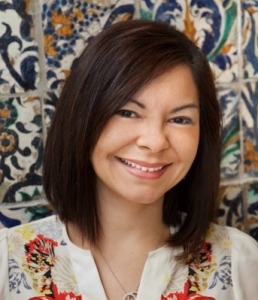Dr. Mary Jo Arnoldi is the Curator of African Ethnology and Art in the Department of Anthropology at the National Museum of Natural History, Smithsonian Institution. She received her Ph.D. from Indiana University in 1983 in African Art History. She has been conducting research in Africa since 1978 with an emphasis on African arts and material culture. She has published extensively on African performing arts, youth, public culture, and post-colonial nationalism. She has also published on the museum’s historic Central African collections and on the history of the representation of Africa at the Smithsonian. Dr. Arnoldi has curated exhibitions at the Smithsonian Institution and at several other museums. She was a lead curator for NMNH’s permanent exhibition, African Voices, which opened in late 1999. In 2003 she co-curated the Mali Program, From Timbuktu to Washington, at the Smithsonian Folklife Festival in Washington, DC that featured 150 Malian artisans and musicians during a two-week festival on the National Mall. In 2013 she curated an exhibition, Mud Masons of Mali, at the National Museum of Natural History.
 Drew Barker
Drew Barker
Drew Barker is the Performing Arts Librarian at the UMD Michelle Smith Performing Arts Library. He is the subject librarian for Theatre, Dance, & Performance Studies. Curator of the exhibit “The Triumph of Isabella: Exploring Performance Through Art” (2018-2019). Dramaturgy experience at UMD’s Fearless New Play Festivals, Center Stage (MD), Theatre J (DC), and Triad Stage (NC). His research interests include the playwright Naomi Wallace, information design, information literacy, and the American Civil War. He earned his MA & MLS from the University of Maryland, College Park. www.drewbarker.info
 Ann Bennett
Ann Bennett
Ann Bennett has more than 20 years’ experience working in archaeology, museums, and education. She is very active in local and regional historical and cultural organizations and is the past-president of the Archaeological Society of the Northern Chesapeake. Mrs. Bennett currently works as the Executive Director of the Laurel Historical Society in Laurel, Maryland, and is an adjunct professor in anthropology and sociology at Cecil College. She serves on the Small Museums Administrators Committee for the American Alliance of Museums and the Small Museums Committee for the American Association for State and Local History.

Benjamin Blake
As the Labor Collections Archivist, I assist union members and officers, students, teachers, professors and the general public in using our unique historical documents, photographs, audiovisual material and artifacts for their research. To that end, I have overall responsibility for managing and describing over 20,000 feet of material, including the historical international records of the AFL-CIO, the Carpenters and Bakers unions. I also have responsibility for acquiring new collections and providing records management consultation services. I hold a BA in labor economics, Hampshire College, MA in labor history, Cleveland State University, and MLIS in labor archives, University of Pittsburgh.
 Dr. Aleia M. Brown
Dr. Aleia M. Brown
Dr. Aleia M. Brown serves as the Assistant Director of the African American History, Culture, and Digital Humanities (AADHum) Initiative. She was the recipient of the 2017-2019 Mellon-ACLS public fellowship, working as program manager at the Humanities Action Lab. There she launched the multi-media installation Climates of Inequality: Stories of Environmental Justice. As Curator of African American History and Culture at the Michigan State University Museum she worked with the Desmond & Leah Tutu Legacy Foundation in Cape Town, SA, to co-curate the traveling exhibition Ubuntutu: Life Legacies of Love and Action, and co-author the companion catalog. She is also the co-organizer of #BlkTwitterstorians and #MuseumsRespondtoFerguson. Her current manuscript in progress illuminates the sophisticated ways that makers have visualized Black political thought. Brown holds a Ph.D. in Public History from Middle Tennessee State University.
 Dr. Aaron Bryant
Dr. Aaron Bryant
Aaron Bryant is a curator at the National Museum of African American History and Culture. Prior to the Smithsonian, he curated the collections at Morgan State University’s James E. Lewis Museum of Art. Bryant has lectured at Harvard, Johns Hopkins, Duke, the Metropolitan Museum, Cambridge, Oxford, and the British Museum. Additionally, he traveled with the State Department to present lectures throughout Spain. He has received honors from the Lyndon Johnson Presidential Library, the New York Public Library, the Maryland Historical Society, the University of Maryland, the Smithsonian Institution, the American Association of Museums, and the Organization of American Historians and Immigration and Ethnic History Society. Additionally, Bryant received honors from Congress, the Justice Department, and the Royal Anthropological Institute, UK. Bryant chairs Baltimore City’s Public Arts Commission and serves on the city’s Commission on Historical and Architectural Preservation.
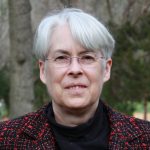 Dr. Mary Corbin Sies
Dr. Mary Corbin Sies
Dr. Mary Corbin Sies is the Founder and Director Emerita of MSMC and an Associate Professor Emerita of American Studies at UMD. Before her retirement, she was also an affiliate faculty member in the Department of Women’s Studies, the Historic Preservation program, and the Consortium on Race, Gender & Ethnicity. She received her Ph.D. in American Culture from the University of Michigan in 1987. Her research and teaching interests span material and visual culture, planning history, architectural history, urban/suburban history, and cultural and social history of the U.S. in the 19th and 20th centuries. Her most recent edited book (with Isabelle Gournay and Robert Freestone), Iconic Planned Communities and the Challenge of Change (University of Pennsylvania, 2019) was awarded the best-edited work in planning history by the International Planning History Society in 2020. One of the four founding members of the Museum Scholarship and Material Culture graduate certificate program, Dr. Sies previously directed the program from 2006 until 2013. She has consulted on museum exhibitions for the Margaret Strong Museum, the National Building Museum, and the Bass Museum in Miami Beach. Locally, she volunteers with the Greenbelt Museum and the Lakeland Community Heritage Project, where she is part of the Lakeland Digital Archive team, a community/university collaboration pioneering an equitable and community-driven digital heritage project. She is an avid museum-goer with a special appreciation for community museums and local heritage societies around the world.
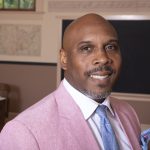 Omar Eaton-Martinez
Omar Eaton-Martinez
Omar leads Prince George’s County Historical Resources which include historical house museums, an aviation museum, the Black History Program, and archaeological parks. He oversees the programming of those sites with an emphasis placed on preserving, sustaining, and enhancing these resources as well as engaging and building communities through education, outreach, and innovation. He has recently worked at the Smithsonian’s National Museum of American History, National Park Service, the Office of the National Museum of the American Latino Commission, NASA, and he also was a K-12 teacher in NYC and DC.
He has had leading roles in racial equity organizations like Museums and Race: Transformation and Justice, Museum Hue as well as a part of the Museum as Site for Social Action project. His research interests are Afro Latinx identity in museum exhibitions, Diversity and Inclusion in museums and cultural institutions; and Hip Hop history, culture, and education. Moreover, he has supported public history projects centering blackness in Puerto Rico.
Ronit Eisenbach is an architect, visual artist, and Professor of Architecture at the University of Maryland. A graduate of the Cranbrook Academy of Art and the Rhode Island School of Design, Eisenbach’s multi-disciplinary spatial practice and design scholarship are located at the intersection of art, architecture, and community.
Through the construction of temporary site-specific environments, she explores how the perception of subjective, invisible, and ephemeral objects affects understanding and experience of place. Eisenbach’s approach is interdisciplinary, partnering with colleagues and local knowledge keepers to create public works that participate in, shape, and confront change.
Co-author of Installations by Architects: Experiments in Building and Design, she was founding curator of the Kibel Gallery at MAPP, and is director of the National Center for Smart Growth’s Creative Placemaking Collaborative and the new Creative Placemaking minor. During her tenure, the Kibel mounted over 65 exhibitions, including her last exhibition, Making the Holodomor Memorial: Context and Questions which anchored the 2021 symposium Marking Loss, Making Memorials.
Dr. Bernard Finn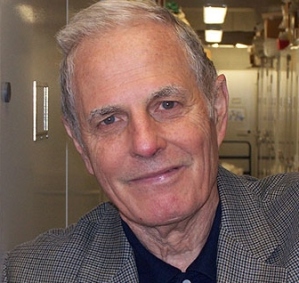
Dr. Bernard Finn has a bachelor’s degree in Engineering Physics from Cornell and a Ph.D. in History of Science from the University of Wisconsin. He came to the Smithsonian’s Museum of History and Technology (now American History) in 1962 as curator of the electrical collections, converted to “emeritus” after his retirement in 2005. His scholarly works (publications, presentations, exhibits) have dealt with various individuals (Franklin, Edison, Bell, Tesla) and topics (communications satellites, lasers, energy conversion, lighting). He has paid special attention to underwater communications cables.
His interest in the history of museums led him to help persuade the Smithsonian to establish a seminar in museum scholarship jointly with the University of Maryland in 1996 (expanded to a certificate program in 2002). About the same time, he was co-founder – with colleagues at the Science Museum (London) and the Deutsches Museum (Munich) – of an organization, Artefacts, which promotes the use of objects in studies of the history of science and technology and has been the focus of much of his attention in recent years.
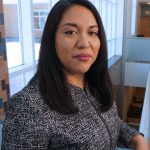 Dr. Perla Guerrero
Dr. Perla Guerrero
Perla M. Guerrero is Associate Professor of American Studies and U.S. Latina/o Studies at the University of Maryland, College Park. Her research and teaching interests include relational race and ethnicity with a focus on Latinxs and Asian Americans, space and place, immigration and legality, labor, U.S. and Mexican history. Her first book, “Nuevo South: Latina/os, Asians, and Remaking of Place”, examines how racial cleansing and sundown towns made northwest Arkansas into a particular kind of place and analyzes the political and economic factors that are shifting social conditions and racial mores. She’s currently working on her second book, “Deportation’s Aftermath: Displacement and Making a Life in Exile”, which seeks to understand what happens to different kinds of people after repatriation and the ways in which U.S.-based inequality is reproduced in Mexico.
 Lae’l Hughes Watkins
Lae’l Hughes Watkins
She is the Founder of Project STAND, the first-of-its-kind collaborative effort among archival repositories within academic institutions across the country to create an online portal, featuring analog and digital collections that document student activism that primarily focus on historically marginalized communities. She is the co-chair of University of Maryland’s Studying Slavery 1856 Project, she is a CO-PI on the collaborative Restorative Justice Project with AADHUM, Lae’l is a 2019 Mover and Shaker and received the 2018 Merit Award by the Society of American Archivists for her leadership in Project STAND. Her 2018 article, ‘Moving Toward a Reparative Archive: A Roadmap for a Holistic Approach to Disrupting Homogenous Histories in Academic Repositories and Creating Inclusive Spaces for Marginalized Voices,’ published in the Journal for Contemporary Archival Studies (JCAS), remains one of the most popular pieces.

Dr. Katherine Izsak
Katherine (Kate) oversees the iSchool’s five degree programs and overall curriculum. During Kate’s tenure, the College has generated and maintained a 300% increase in its student body and doubled its academic staff. Kate is applying her broad experience in educational policy and academic administration to the development of new degree programs in innovative areas of information science, including information design, social data science, gaming and media analytics, data journalism, library leadership, and smart and connected communities. Kate also teaches in the College and holds a faculty affiliation with the UMD Department of Anthropology. Her teaching and research interests focus on the study of disasters and community resilience, and she has further teaching interests in pedagogy and instructional design.
Prior to joining the UMD iSchool, Kate served as UMD’s Undergraduate and Graduate Director for Terrorism Studies and as the Education Director for UMD’s National Consortium for the Study of Terrorism and Responses to Terrorism. She has also held positions with UMD’s College of Behavioral and Social Sciences and Center for the Advanced Study of Language (CASL). She has over 15 years of experience in teaching and research in interdisciplinary social sciences.
Kathryn Lafrenz Samuels is Assistant Professor in the Department of Anthropology, with expertise in cultural heritage, environmental anthropology, and political anthropology. Dr. Lafrenz Samuels’ research highlights the growth of heritage practice in the transnational sphere: in the domains of international development, global climate change, human rights, democracy building, transnational advocacy networks, and corporate social responsibility. Her work showcases the persuasive power of cultural heritage, as a social field of public rhetoric for mobilizing change. She received her Ph.D. in Anthropology from Stanford University.
Michelle G. Magalong, Ph.D. is a scholar-activist committed to elevating the stories of underrepresented peoples and places through historic preservation, planning, and public policy.
Dr. Magalong is an Assistant Professor in the Historic Preservation program at the University of Maryland’s School of Architecture. Planning and Preservation, where she previously served as a Presidential Postdoctoral Fellow. She is affiliate faculty in Asian American Studies, Urban Studies and Planning, and American Studies. Dr. Magalong served as the founding President of Asian and Pacific Islander Americans in Historic Preservation (APIAHiP), a national nonprofit organization. She received her BA in Ethnic Studies and Urban Studies and Planning at the University of California, San Diego (UCSD), and MA and Ph.D. in Urban Planning at the University of California, Los Angeles (UCLA).
Michelle worked in preserving historical Asian American neighborhoods and sites including Historic Filipinotown, Little Tokyo, and Thai Town in Los Angeles, and Little Manila in Stockton, California. She has served on advisory boards including for the National Park Service, the State of California, and the City of Los Angeles on their respective theme studies and context statements on Asian Americans and Pacific Islanders. She served on the board of directors for California Humanities. Michelle is a featured speaker at national conferences on historic preservation, advocacy, and the nonprofit sector, and was named “40 Under 40: People Saving Places” by the National Trust for Historic Preservation in 2018.
Dr. Barnet Pavao-Zuckerman is Associate Professor in the Department of Anthropology at the University of Maryland. She received her Ph.D. from the University of Georgia in 2001, completing her dissertation research in the Georgia Museum of Natural History. Prior to arriving at the University of Maryland, she was Associate Curator of Zooarchaeology at the Arizona State Museum for over a decade, as well as Associate Professor and Associate Director of the School of Anthropology at the University of Arizona. She is an archaeologist and is currently conducting research on the colonial-period experiences of Native Americans in southeastern and southwestern North America, looking at the impact of the introduction of domesticated animals and European market economies on indigenous ecological and economic systems.
Dr. Margaret Salazar-Porzio is a Curator of Latina/o History and Culture in the Division of Home and Community Life. She has research interests and expertise in 20th century visual and material culture of the Western United States, Pacific Rim, and Mexico; Race, Citizenship and National Identity in U.S. urban history; family formation and childhood; and K-20 Education. Before joining the Smithsonian’s National Museum of American History, Dr. Salazar-Porzio received her Ph.D. in American Studies and Ethnicity from the University of Southern California in 2010, served as an Associate Research Scholar and Lecturer at the Center for Institutional and Social Change at Columbia University Law School, and held a Smithsonian Institution Latina/o Studies Postdoctoral Fellowship. In addition to receiving research fellowships from the Guggenheim, Rockefeller, and National Science Foundations, she was also a primary education teacher in Los Angeles, California, where she received a local Teacher of the Year award in 2004. Dr. Salazar-Porzio’s research combines these experiences with deep commitments to education, equality, and democratic engagement in the service of her work at the Smithsonian Institution.

Megan Searing Young
Megan Searing Young has been the Director of the Greenbelt Museum since 2008. The Museum consists of an historic house as well as an exhibit gallery and is focused on the history of the New Deal-era experimental community which was established in 1937. In addition to overseeing the day to day operations of the Museum, she has curated numerous exhibitions, lectured on many aspects of Greenbelt history, and in 2012 co-authored Images of America: Greenbelt. She earned a B.A. in Art History and Women’s Studies from Johns Hopkins University and an M.A. in the History of Decorative Arts from the Cooper-Hewitt, Smithsonian Institution, and Parsons School of Design program where she focused on early twentieth century design, material culture, and social history. A Prince Georges County, Maryland native, she currently lives in Washington, D.C. with her husband and two daughters.
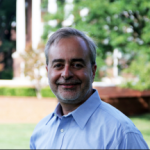 Dr. Paul Shackel
Dr. Paul Shackel
Dr. Paul Shackel joined the Department of Anthropology in 1996 after working for the National Park Service for 7-½ years. He received his Ph.D. from the State University of New York at Buffalo in 1987.
His extensive work at Harpers Ferry delves into issues of class and labor in this early industrial town. He received a 3-year NSF Research Experiences for Undergraduates award that allowed him to partner with other institutions to train undergraduates in archaeology and explore issues of race, class and ethnicity on the Illinois western frontier. The work focused on the historic town of New Philadelphia, Illinois. The development of civic engagement activities became an important part of this archaeological program. He is now working with graduate and undergraduate students on the Anthracite Heritage Project, a program that includes oral histories, documentary research, and archaeology in the anthracite region of Pennsylvania.
Joseph Sherren joined the iSchool in 2020 as an adjunct lecturer in digital curation theory and practice and in 2022, became the college’s Master of Library and Information Science Program Coordinator. He has been in the cultural heritage field for over 7 years, working in small museums as collections manager, head of collections volunteers, and advising on the practice of collections management, records management, and digital heritage management. He is also an independent museum consultant specializing in collections stewardship and policy development. Through his work he creates platforms for histories of marginalized communities- BIPOC, LGBTQ+, etc.- to be told and advocates for social equity in museum spaces.
Sretenović has been a long-time curator of modern and contemporary art with special interests in cross-disciplinary art practices and in bridging theoretical knowledge with hands-on experience. She has been at The Phillips Collection in Washington DC since 2009, first as a Senior Curator of Modern and Contemporary Art, and now as a Cross-departmental Director of Contemporary Art Initiatives and Partnerships. During her tenure, she initiated and oversaw a series of ongoing art projects called Intersections, inviting contemporary artists—national and international, emerging and established—to engage with the museum permanent collection and architecture and create new work(s). The participating artists included, A. Balasubramaniam, Sanford Biggers, Los Carpinteros, Ranjani Shettar, Alyson Shotz, and Richard Tuttle, among many others. In addition, Sretenović had organized monographic exhibitions of prominent artists, including Robert Ryman, Ellsworth Kelly, Antony Gormley, and the first museum retrospective of Cuban artist Zilia Sanchez. She is currently preparing a group exhibition that explores sensorial, metaphorical and socio-political signification of food and celebrates cultural diversity. Prior to joining the Phillips, Sretenović was a curator at Bell Gallery, Brown University, while also teaching contemporary art and art theory at the Rhode Island School of Design. Earlier in her career, she worked for the University at Buffalo (SUNY), and the Brooklyn Museum of Art. She holds a BA in Art History from University of Belgrade, Former Yugoslavia, an MA from the School of the Art Institute of Chicago, and a Doctoral degree in Humanities from Syracuse University.
